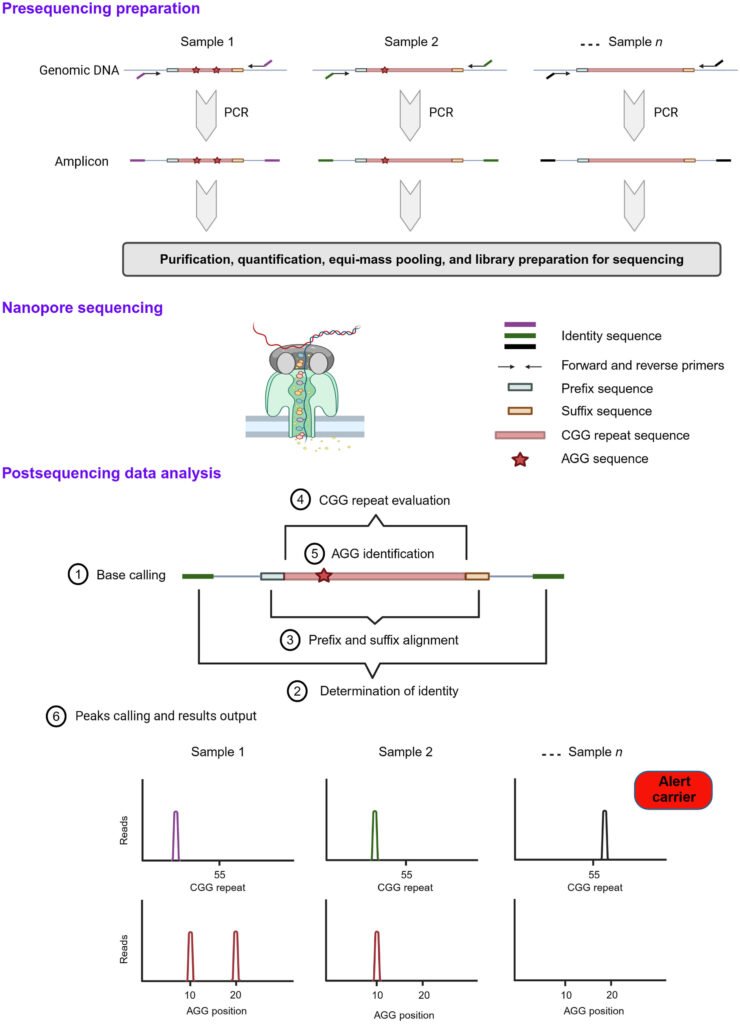Researchers have recently unveiled a groundbreaking nanopore sequencing assay designed to pinpoint carriers of fragile X syndrome (FXS), the primary cause of monogenic autism spectrum disorder and hereditary intellectual disabilities. Published in The Journal of Molecular Diagnostics, this study aims to address the critical need for a screening tool capable of identifying FXS carriers in a more comprehensive, expedited, efficient, and cost-effective manner than current methodologies, ultimately enhancing genetic counseling practices.
FXS impacts approximately 1 in 7,000 females and 1 in 4,000 males globally, manifesting with varying degrees of intellectual disability, developmental delays in speech and motor skills, behavioral challenges, and social issues akin to ADHD and autism spectrum disorder symptoms, among other characteristics. Dr. Qiwei Guo, the lead researcher from the Department of Central Laboratory at Xiamen University, China, emphasized the importance of FXS carrier screening for the general population, highlighting the necessity for an accurate, fast, affordable, and effective assay to evaluate a large number of female samples efficiently.
The underlying gene responsible for FXS is fragile X messenger ribonucleoprotein1 (FMR1), an X-linked dominant gene pivotal for synapse formation and dendrite development. The number of CGG repeats within the FMR1 gene serves as a critical indicator of normal gene status, premutation carriage, or full mutation presence leading to FXS symptoms. Dr. Yulin Zhou, a co-investigator on the project, demonstrated the assay’s ability to accurately identify premutation FMR1 alleles and quantify CGG repeats and AGG interruptions, crucial in determining the risk of full mutation expansion in carriers, thereby streamlining genetic counseling processes.
Through the incorporation of identifier sequences, the researchers successfully executed multiple sample testing within a single assay, significantly boosting test capacity and reducing costs. The nanopore sequencing assay boasts a rapid turnaround time of approximately two days for testing 100 samples concurrently, conducted by a technician in a standard molecular diagnostics lab. Its accessibility and portability make it a viable option for widespread adoption, especially in underserved regions globally.
Dr. Guo envisions a future focused on combating genetic diseases and reducing birth defects, particularly through prenatal diagnosis and intervention for FXS. The novel nanopore sequencing assay has overcome key limitations of existing FXS carrier screening methods, paving the way for enhanced genetic counseling and broader implementation on a global scale. This innovative approach signifies a significant step forward in the realm of genetic screening and counseling, offering hope for improved outcomes and interventions in the realm of fragile X syndrome.
For more information, the study titled “Fragile X Syndrome Carrier Screening Using a Nanopore Sequencing Assay” can be accessed in The Journal of Molecular Diagnostics (2025) with DOI: 10.1016/j.jmoldx.2025.03.008.


